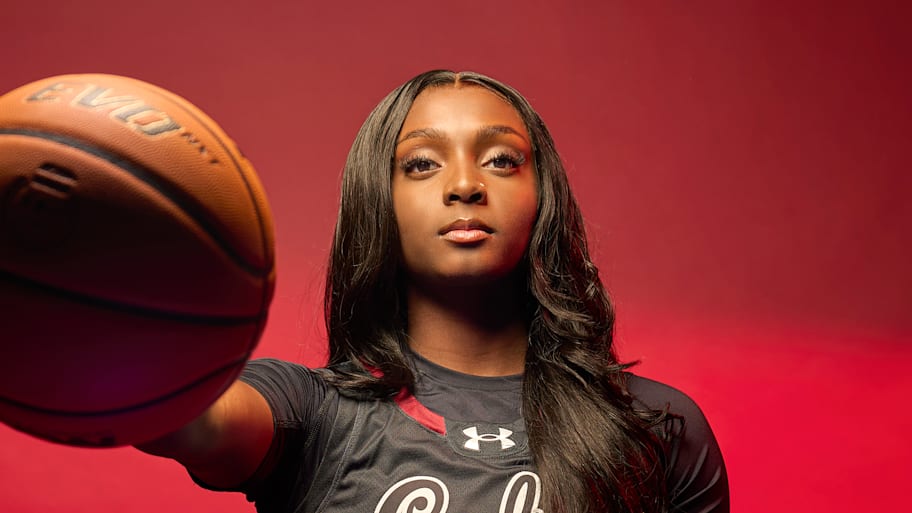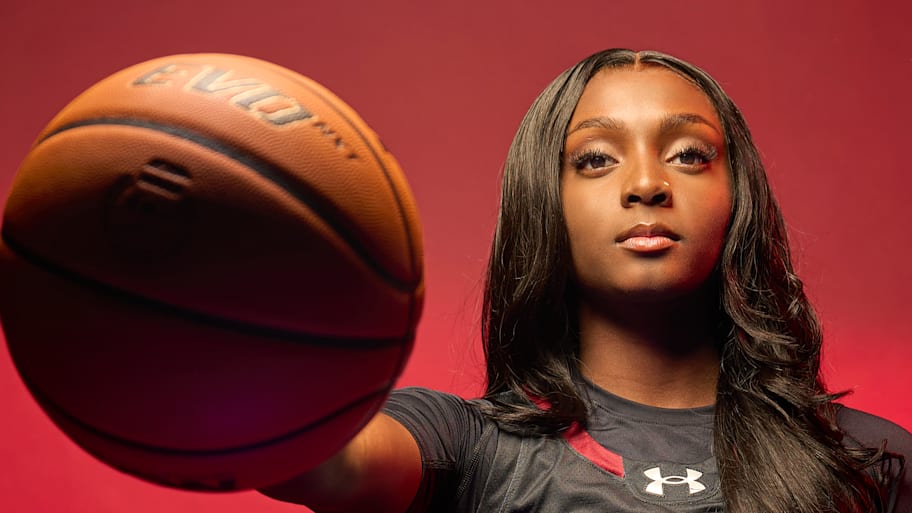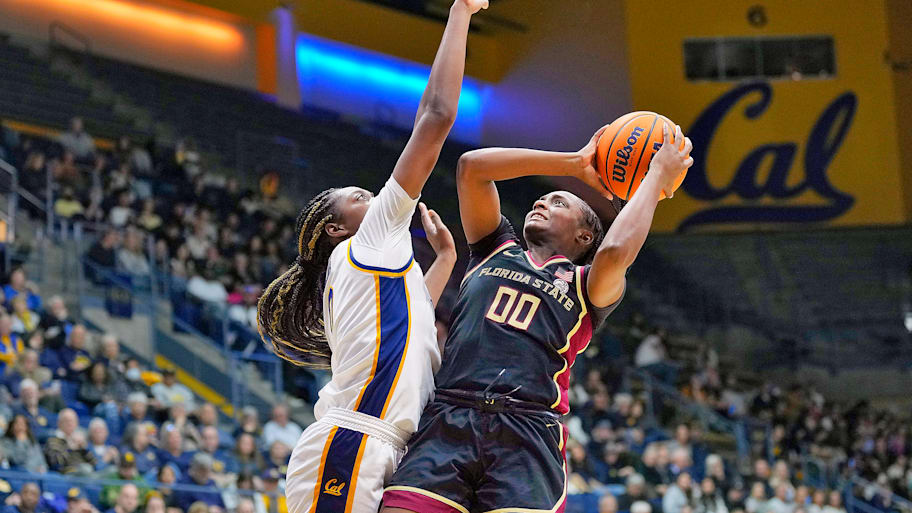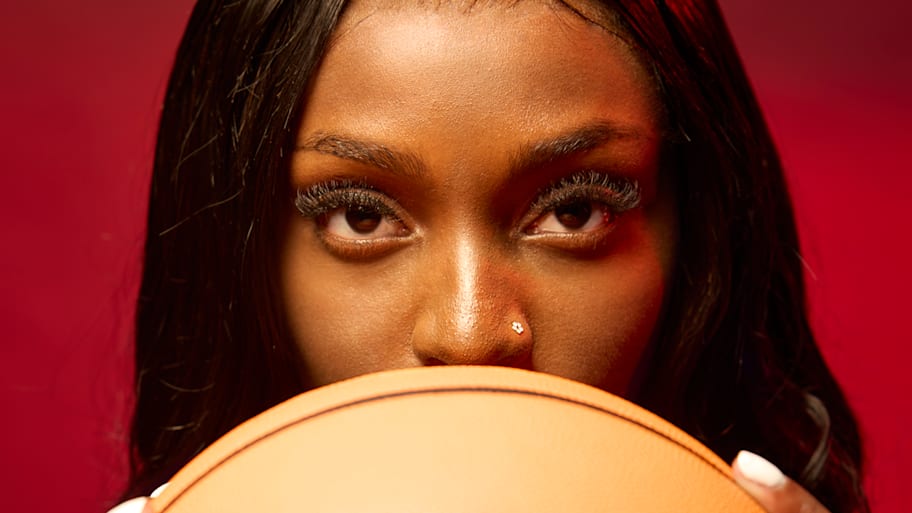
The game had not yet begun, but Derek Latson was pretty sure his daughter’s season was over. Ta’Niya Latson had done so much in her three years at Florida State. She led the nation in scoring. She was named first-team All-ACC three times and a second-team All-American. Now here she was, leading the sixth-seeded Seminoles into a second-round game against third-seeded LSU, which raised the question:
Who were they kidding?
“I knew they were outmatched,” Derek says. “I knew she was going to do what she had to do, but I just knew that it was probably gonna be it.”
Ta’Niya scored 30 points that day. Her team lost, 101–71, anyway. Three days later, she put her name in the transfer portal. Ten days after that, Connecticut ran Dawn Staley’s South Carolina team off the floor in the NCAA championship game, largely because the Huskies had more players who could create their own shots.

Staley and Latson were such an obvious match that even if they hadn’t expressed interest in each other, a mutual friend would have tried to set them up on a blind date, which is kind of what happened: Gamecocks guard Raven Johnson played high school ball with Latson in Georgia. Her pitch to Latson: “Let’s go win a championship.”
Johnson did not have to explain why they could. In the past four years, the Gamecocks have won as many games in the Final Four (five) as they have lost in the months leading up to it. Over the past six seasons, they are 202–13 overall.
Derek told his daughter, “You’ve got to get somewhere for you now.” Ta’Niya considered a few other schools in a lists-are-fun-so-why-not-make-one? sort of way. But UConn was too far from home. While Tennessee has been reestablishing itself as a superpower, the Lady Vols lasted only one round longer than Florida State last year. She did not give herself a chance to fall in love with Texas or LSU. She didn’t visit any schools—not even South Carolina.
“She just said this is where she wants to be,” Staley says. “It doesn’t happen like that very often—for us or anybody else. It happens that way for people who have clarity on what they want.”
Now South Carolina is the favorite to win the national title, which would be its fourth under Staley, who’s entering her 18th season. Latson could have kept rolling the dice at Florida State, or she could join the team with hotels on Boardwalk and Park Place. But she is seeking something besides a championship—something more subtle. She believes that by playing for a team that needs her less, she will be compelled to do more.
Brooke Wyckoff did just about everything that a coach is supposed to do. As an assistant at Florida State, she built a relationship with Latson early, before every major power was recruiting her. Latson became a top-20 recruit, but she chose the Seminoles largely because of their bond, and she stuck with her commitment after Wyckoff was promoted to head coach.
Wyckoff put the ball in Latson’s hands as a freshman. She supported her and promoted her and challenged her. They made three straight NCAA tournaments together. Latson left anyway.
“It was very difficult,” Latson says. “I love Florida State. That’s my heart.”
When a transfer is considering her program, Staley always asks: Why are you leaving? “I want to make sure that I’m able to deliver [on] the reason why she’s leaving,” the coach says. Latson easily could have said she wanted to win a national title and left it at that.
“She said she had a great situation there,” Staley says. “It was great. But she also knew that she would probably have to play the same role as she played for three years.”

A star on a pretty good team accumulates an unhealthy amount of power, and Latson realized she did not always use hers wisely.
“My first two years, I did not take the weight room serious,” Latson says. “I just wanted to play.”
As for her defense … “Last year, it was really on me,” Latson says. “[Wyckoff] did push me to play defense. She did. It was just knowing how much I could give. I took off reps on the defensive end. I had to hold myself accountable.”
Is it fair to say she occasionally coasted because she could get away with it?
“That’s fair,” Latson says. But she was also stretched thin carrying the offense. “I just needed a change after last year, to challenge myself,” she says. (Wyckoff declined a request to talk to Sports Illustrated for this story.)
There was a time when a player in Latson’s sneakers would put herself through a thorough self-examination entering her senior year. Ask some now-or-never questions. Commit to greatness. The leap in maturity from junior to senior year was an essential part of the collegiate athlete’s journey. Now it’s just one option among many.
Last season Latson found herself watching South Carolina every chance she got. She told herself it was because the Gamecocks were one of the nation’s best teams, or that she was keeping up with her friend Raven. But in retrospect, she says, “I was unconsciously looking at ways to grow my game. I knew what I wanted just by watching them.”
Once Latson started thinking about leaving, it was hard to stop. Even in the best-case scenario, Florida State will not be a better team than South Carolina. Wyckoff is not a better coach than Staley. She will not prepare Latson better for the pros. FSU does not have more money, more support or a better training staff. Latson had friends there, sure, but she had friends at South Carolina, too.
The main reason to stay in Tallahassee was that she was already there—and even that was also a reason to leave. In a sense, her choice was not just between a top-25 program and a top-two powerhouse. It was between another year of undergrad basketball and hoops graduate school.
Shortly after she arrived in Columbia, Latson noticed something. See if you can spot what it is.
Staley: “We’re going to need her production. But it’s just different.”
Latson: “We lifted [at FSU] but it’s different in the SEC.”
Staley: “Our program has produced pros. Not to say that Florida State doesn’t. But it’s just different.”
Derek Latson, on his daughter’s first few weeks in Columbia: “She was exhausted. She said the work is totally different.”
Different sounded fantastic before Latson experienced it. Then it, um, hit different. Although almost everything at South Carolina is better—because it is better—any moment can seem worse. The strength program’s fabled “Final Four Fridays” produce aches now and champions later. Staley acknowledges that Latson’s transition wasn’t “smooth,” but that didn’t come as a surprise.

“Competitors are wired a little differently,” Staley says. “They anticipate having to go through some things, but they don’t visualize bad days. So when it smacks them in the face, it doesn’t feel good, right? But for me, I want it to keep smacking. When you can understand that this is what you’re supposed to be going through right now, you embrace it.”
There is a reason Staley has built a superpower in an era of constant upheaval: In a profession of control freaks, she maintains her poise. On the eve of South Carolina’s Final Four matchup with Texas last spring, Staley said: “I’m talking to parents. I’m talking to people in the transfer portal. I’m talking to agents. It’s a lot. But if you’re not someone that can easily pivot, this thing will swallow you up.” While many coaches cling to their best players at the first sign of trouble, Staley employs a deeper rotation than any other top coach and sticks with it.
She convinces players it is in their best interest to pass, to defend and even to sit. Kamilla Cardoso did not start for the Gamecocks until she was a senior, at which point she became a second-team All-American, the NCAA tournament’s Most Outstanding Player, and the No. 3 pick in the 2024 WNBA draft. Staley’s players accept that she makes today harder so that tomorrow is easier. She racks up wins by playing the long game.
“Always,” Staley says. “A lot of people don’t understand that. The long game. The long game.”
When Latson wobbled upon arrival, Staley just thought, Better now than in February.
“I’m like, ‘It’s just June!’ ” Staley says. “You gotta make her laugh about it, because it’s hard. This is her life, this is her career. She’s putting it all into us. I’m not a panicker.”
The 5' 8" Latson is an explosive offensive player; one of Staley’s comps for her is Allen Iverson. Players of her type—quick feet, good handle, always thinking they can get a bucket—tend to have the same flaws. They go for steals (and potential fast breaks) instead of playing sound team defense. They fire up low-percentage shots because they haven’t scored in a few possessions and they think it’s their turn.
Some players—like Iverson—carry those flaws all the way to the Hall of Fame. But the moment Latson arrived at South Carolina, she was no longer a singular star. She was a player who was expected to meet the highest standard.
Latson said in September that “my jumping has gotten a lot better. My overall body, my structure, I feel I’m a lot stronger.” Staley has pushed her to defend with positioning: “Less hands, more body. Put your strong body in front of someone and have them bounce off of you. She’s mastered it.”
That last part is what has impressed Staley as much as anything: “She picks up on things quickly, quickly, quickly. We’re getting a seasoned senior.” By the end of the summer, Latson already looked like a better player than when she arrived. But she hadn’t played any games yet. And those will be different, too.
In three seasons at Florida State, Latson averaged 21.3, 21.4 and 25.2 points per game. But in the last decade, only two Gamecocks averaged more than 16 points per game for a season—and those two (A’ja Wilson and Aliyah Boston) were no-argument No. 1 WNBA draft picks.
Funny thing about playing with stars like Joyce Edwards: They want the ball, too. Latson is trying to improve on her passing, but the bigger challenge will be ignoring the box score. When Latson entered the portal, she surely did not think I want to go help a team improve its spacing. But that is part of her job now.
“Sometimes she’s going to have to allow defenses to not think about her so much,” Staley says. “Sometimes you gotta make them forget about you.”
Latson must trust that the ball will come back her way eventually, because it will. Staley acknowledges that playing the long game is “hard with T, because it’s the short game with her and us. But she’s coming in with some things that naturally she does and naturally we don’t have.” In other words: T will get hers. Just not as often as she did before.
Latson knows this can go poorly. Hailey Van Lith was a superstar scoring guard at Louisville who transferred to LSU for a chance to play with more talent and become a better pro prospect, and it nearly broke her. After seeing her scoring average plummet to 11.6 points per game and her shooting percentage drop to 37.8%, Van Lith transferred again the next year, to TCU, where the Big 12 Player of the Year had a career-high shooting percentage of 45.2%.
There will be hard days, even when South Carolina wins. But Staley will remind Latson: the long game. Playing Latsonball for another 10 years was never a career option. Wilson, the Aces star and four-time league MVP, had the highest usage rate in the WNBA this regular season; she finished 30.7% of her team’s possessions when she was on the floor. Latson’s usage rate at Florida State last season was more than 38%. She averaged more field goals (19.5) and free throws (7.8) last season than anybody in the WNBA this year.
Win or lose, South Carolina will prepare Latson for professional life. But who are we kidding? At South Carolina, it’s win or win.
More College Basketball on Sports Illustrated
Listen to SI’s new college sports podcast, Others Receiving Votes, below or on Apple and Spotify. Watch the show on SI’s YouTube channel.
This article was originally published on www.si.com as Ta’Niya Latson Didn’t Choose South Carolina for the Reason You Think.







